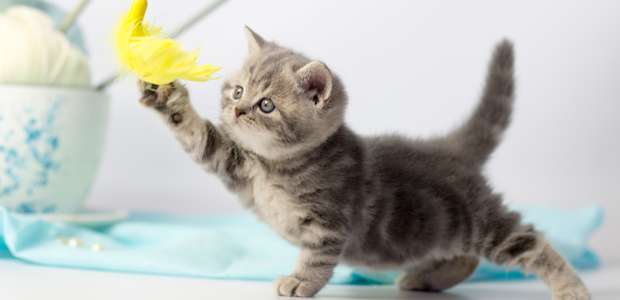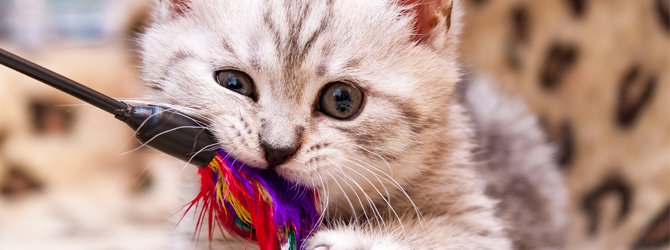How to stop a kitten from biting
Welcoming a kitten into your life is an exciting time. They are little balls of fluff that love to play and it’s easy for kittens to become overly excited, which can lead to biting.
It’s not uncommon for kittens to bite and there are many reasons why they might do this, but how do we nip this behaviour in the bud? Let’s take at why kittens bite and our top tips for stopping them.
Why does my kitten bite me?
Kittens are very playful and sometimes they can get carried away and excitable, which can lead to biting. Much like puppies, the first 8 weeks after getting your kitten is a vitally important period.
These two months are a key stage in the development of your kitten, cat experts call this stage ‘the socialisation period’. During this time, your kitten is open to new experiences, and the things that happen to them now are less likely to scare them, or to become an issue, later in life.
It’s important that your kitten is trained during this time, to stop unpredictable biting and scratching carrying on. Your kitten’s reaction could be due to fear, whether it’s certain situations or people, such as greeting unfamiliar guests.
To better understand your kitten’s reaction, gently examine your kitten and carefully pet them on different parts of their body to try and identify if there are certain areas that make them react in a negative way. Some kittens will be comfortable being petted all over, while others can react when you touch their paws, stomach, or face.
Read more: How to clip your cat's nails
How do I stop my kitten from biting?
Fortunately, there are a few different techniques you can use that will help your kitten to understand that biting isn’t acceptable.
Playing with toys
Not only are toys a great way of bonding with your new feline friend, they also redirect their attention away from your fingers when you are playing. Toys are also good for getting a kitten used to their new environment. You choose from a variety of toys in our online shop.
Give them a time out
This is a useful tip if your kitten is overstimulated. Cats are known for responding to a timeout, and will often emerge with a different attitude. If they've been misbehaving, give them some space in a room on then own for 15 minutes or so.
Keep their claws in check
Kittens have sharp claws that help them go about their agile lifestyle of jumping, climbing and catching prey. A scratching post is a great way for your kitten to keep their claws in good condition. Your kitty will be happy with cardboard or an old piece of carpet.
You should only trim your cat’s nails if they are too long, not because they are sharp. It's worth noting that 'de-clawing' is illegal in the UK. If you're concerned about your kitten’s nails, it's best to speak to your vet.
No matter how much training you and your kitten do, there will always be occasions when your cat has a ‘crazy kitten’ moment. This is part of their genetic make-up and comes hand in hand with being a cat owner.

Read more: 7 kitten essentials: getting your kitten off to the best start
Why does my kitten's behaviour change so quickly?
As any cat owner will tell you, a kitten can go from a laidback purring powderpuff to biting and scratching in no time. It can seem confusing when this happens, especially during good-natured play sessions that your kitten seemed to be enjoying. When your kitten reacts like this, they are trying to tell you that they’ve had enough of petting or playing.
It can be tempting to try to be overly affectionate to your kitten after this happens, but in this situation, the best thing to do is to give your kitten space.
Treats are a great way of rewarding good behaviour so be sure to praise your kitten and give them treats for positive/desirable actions, such as letting you pet them.
Need more kitten advice?
If you’d like further info on kitten care, speak to your vet. They can provide advice for your specific pet and situation. Find your nearest vet using our Find a Vet page.

